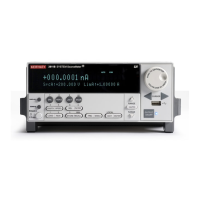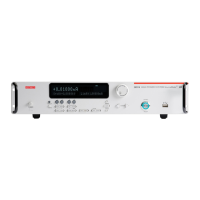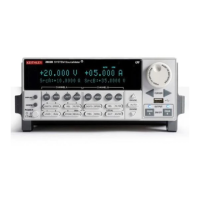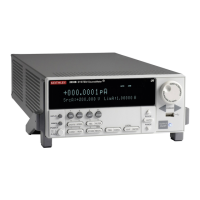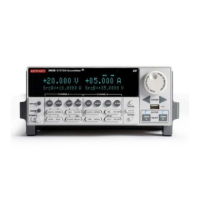2600S-901-01 Rev. C / January 2008 Return to Section Topics 10-11
Series 2600 System SourceMeter® Instruments Reference Manual Section 10: Digital I/O and Triggering
Basic digital I/O commands
Use the following commands to perform basic steady-state digital I/O operations such as reading
and writing to individual I/O lines or reading and writing to the entire port.
NOTE The TSP-Link synchronization lines can be used for both input and
output. You must write a 1 to all TSP-Link synchronization lines that
are used as inputs.
TSP-Link Synchronization line trigger commands
Use the following commands to trigger the Series 2600 using TSP-Link synchronization lines.
Basic digital I/O programming example
The commands below set bit 1 of the digital I/O port high, and then read the entire port value.
tsplink.writebit(1,1) --Set bit 1 high.
data = tsplink.readport() --Read digital I/O port.
Synchronization line trigger example
The commands below set the line 2 pulse width to 10μs, trigger mode to falling edge, and then
assert a trigger pulse on that synchronization line:
tsplink.trigger[2].pulsewidth = 1e-5 - Set line 2 pulse width to 10ms.
tsplink.trigger[2].mode = tsplink.TRIG_FALLING - Set line 2 mode to falling edge.
tsplink.trigger[2].assert() - Assert trigger on line 2.
Commands for digital I/O triggering:
tsplink.trigger[N].assert()
tsplink.trigger[N].clear()
tsplink.trigger[N].mode = mode
tsplink.trigger[line].pulsewidth = width
tsplink.trigger[line].release()
tsplink.trigger[line].wait(timeout)
Generates a trigger on the synchronization line
Clear the event detector for a trigger
Control I/O trigger event detector mode:
see “tsplink.trigger[N].mode” on page 12-113 for
more information.
Sets the trigger pulse width
Release the latched trigger
Waits for a trigger
Table 10-4
TSP-Link Triggering commands
Command Description

